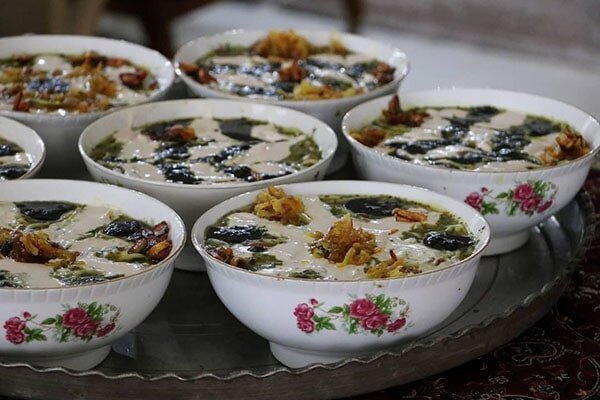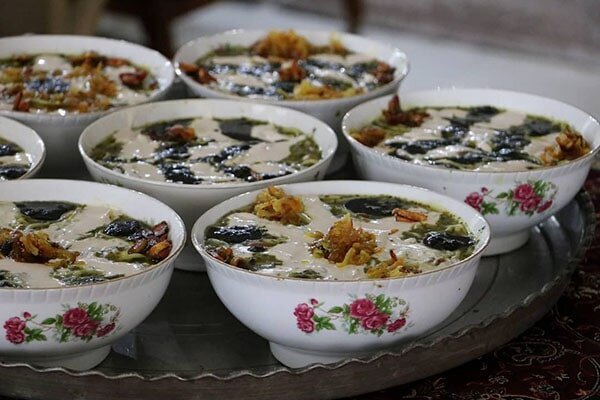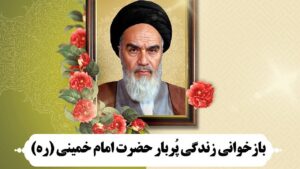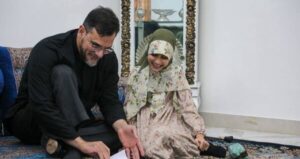
to report Missionary thought and culture base, In an interview, Aminullah Alimoradi, pointing out that the month of Rajab is one of the three months that are called the month of God along with Sha’ban and Ramadan, said: there are many religious and devotional occasions in the beginning, middle and end of it, which are shaped in the culture of the people of Iran. have adopted a ritual; Among these occasions are the birthday of Imam Muhammad Baqir (a.s.) on the first of Rajab, the birthday of Imam Hadi (a.s.) on the second Rajab, Laila al-Raghaib on the first Friday night of the month of Rajab, the birthday of Hazrat Ali (a.s.) on the 13th of Rajab, the practices of Eid al-Bayd and Itikaf and Umm Dawood in the middle of this month, the Prophet’s (PBUH) ritual on the 17th or 27th of Rajab (according to Sunni and Shiite narrations) and the Ajab-ul-Ajab ritual He mentioned on the last day of Rajab and the first night of Sha’ban.
According to Isna’s report, he added: Meanwhile, the birthday of Hazrat Ali (AS) is celebrated in Iran’s Shiite culture with various and elaborate rituals, including the celebration of the birthday, lighting and decorations, wearing new clothes, congratulating, inviting , holding a celebration, praising and reciting births, giving speeches, distributing sweets and syrups, exchanging gifts, holding Sarvar Afarin events, meeting with Sadat, charity and Vows, naming of newborns, pilgrimage and commemoration of father’s and man’s day.
What do you know about Ishiharam?
This popular culture researcher explained some of the ritual manifestations of the birthday of Hazrat Ali (AS) in Iran and stated: In Qalatin Nubran Saveh, the 13th day of Rajab is the day of “Ishi Haram isiharam”; That is, according to the old beliefs of the people of this region, working on this day is forbidden and a sin. In the same way, the day of Ashura Hosseini and the death of the Prophet (PBUH) are considered “Ishiharam”.
He added: In Barzak, Kashan, in the old days, they decorated the alleys and passages with mouse lights and later with wind lights, but now they light and decorate the streets and alleys with electric lights, moonlight lamps, and modern decorations. In the old days, instead of today’s cloths and flags, carpets or small carpets were hung over the doors of the houses and they organized the ceremony in a very beautiful way. Because there were not many mosques at that time, most of these ceremonies were held in the four-sided mosques. These four-sided houses are in the form of an old, square and square-shaped house with an adobe vault and a very beautiful hallway, which was sacred and important to the people and people believed in it. On this day, sadats hang green shawls on their necks in Dastgerd of Qom.
This popular culture researcher continued: In the village of Tien Nubran Saveh village, the people of the village used to inform the people about the birth of Hazrat Ali (AS) through a person whose name was Chavash. In Bijar, the way to invite guests is by invitation card or by phone. It is also possible to inform a famous person to invite everyone. This person is called “Dang Ker”.
According to him, the night of the 13th of Rajab is known as “Eid Imam” in Asfarorin Buin Zahra and most people celebrate on this day.
Special attention of wrestlers to the birth of Imam Ali (AS)
Alimoradi stated that in Hamedan city, the birth ceremony of Amir al-Mu’minin Ali (a.s.) has a special splendor and effect in addition to the mosques in the fortresses and among the warriors and heroes. . Mosques and monasteries are cleaned and prepared for the celebration of the birth of Hazrat Ali (AS) and the day of the Prophet’s (PBUH) mission. The mentors are invited from other regions and give a speech about the auspiciousness and dignity of these great and auspicious days (the birth of Imam Ali (a.s.) or the birth of the Prophet (pbuh) and then treat the attendees with sweets. Also, on this day, Golrizan festival is held in most Zorkhanehs of Shahrood and they collect help for the needy and prisoners.
He also explained about the customs and traditions of the 13th of Rajab in Nahavand: In this city, those who are “sayeds” hold a celebration in their homes and sing the Mawlid and pour sweets and chocolates on the guests, and those who are in need receive those chocolates. They take it as intended, and if their needs are met, they take some chocolate to the same house the next year and pour it on the guests. On the other hand, on the occasion of the birth of Hazrat Ali (AS) in the mosques, tekkehs and houses of the city, they used to sing praises and celebrate the birth of the Prophet, a ceremony that has remained intact until now.
The sounds and creations of a birth
This popular culture researcher said about the poems and verses that are recited on the birthday of Imam Ali (AS) in different parts of the country: One of the verses of the verse that is recited in the Sardar Tower of Kohgiluyeh is the poem “Ali Goyim, Ali Joyim/Ali O Rah Imanam/Ali” O my dear soul. In Bijar, they play happy songs and play the tambourine and sing the Mawludi for the celebration of Milad. People also gather and show their love for Ahl al-Bayt (AS) by clapping and cheering. In Sari, on the occasion of the birth of Hazrat Ali (PBUH), they mostly sing this praise: “Ali is the teacher of the dervishes/ Ali is the enemy of their thoughts/ Ali is my soul/ Ali is my soul/ Ali is my soul/ Ali is the beginning of faith/ Ali is my soul and soul/ Ali is the guide of my path/ Ali Janam, Ali Janam.
He continued: In Shahreza, on the birthday of Hazrat Ali (a.s.), poems by the late Elahi Qomshaei are recited, the most famous of which begins with this verse: “On the 13th of Rajab, Ayan Shah Din appeared / Kaaba became the Qiblah of the people of certainty”. Beautiful verses are read in all parts of Iran on this day.
Official for the first children of the family
According to Ali Moradi, on the birthday of Hazrat Ali (PBUH), it was common to distribute syrup, sweets, tea, milk, sweets, chocolate, dates, ice cream, fruit, cakes, cookies, etc. in the streets, passages and neighborhoods. They respect the way of this day. But this is also associated with certain customs in some places; It is customary in Saveh that the eldest son of the house must give syrup; If the first child is a boy, he should distribute the syrup among the men, and if it is a girl, he should distribute the syrup among the women.
Pointing out that it is customary to exchange gifts, including stamped banknotes, on the birthday of Hazrat Ali (AS), he said: giving banknotes with writings and signs such as “Ali Ma’al Haq Wal Haq Ma’ Ali”, “Ali Wali Allah”, “Milad” Mouli-al-Muhaddin Ali Ibn Abi Talib be blessed”, “I did not know Mullah, this is Ali Mullah”, “La Fati ila Ali la Saif ila Zulfiqar” and… are very common. In the past, other gifts were exchanged in addition to the giving of stamped banknotes, which people took and kept to bless their incomes.
This popular culture researcher continued: On such days, newlyweds and children were usually loved by those around them. Currently, in some places, it is customary to give gifts to people whose name is Ali on the birthday of Hazrat Ali (AS). Children also receive an Eid from their elders on the birthday of Hazrat Ali (AS).
He added: the people of Miandeh village of Fasa city gather in the mosque on birthdays like the birthday of Hazrat Ali (AS) and receive gifts from the founders of the meeting, which are also paid for by philanthropists. Then, gifts are given to single children or those who have had a child after many years.
From seeing the calendar to Ash Kashk on the 13th of Rajab
Alimoradi pointed out that people try to do all kinds of important things in life with that day in order to benefit from its blessings, and explained: Some people celebrate different occasions like marriage And weddings, circumcision, transactions, traveling, cutting cloth, sewing women’s tents, buying and moving houses, naming children and other good deeds such as the annual payment of khums and zakat on this day. they give
He said about the alms and vows distributed on the occasion of the birth of Imam Ali (a.s.): On the morning of the 13th day of Rajab, Takyeh Heydari of Kashmir gives more than five thousand people Haleem breakfast at breakfast. On this day, in Hosseiniyeh, Hazrat Imam Jafar Sadiq (a.s.) makes Haleem. Similar to this custom is established in Imam Sajjad’s (a.s.) delegation and some other Hosseiniyyas and Takiyas, and people are given Halim breakfast, which people both eat Halim and take with them. This Halim is almost like Mashhad’s Shule, which the residents are very fond of. At the same time, they cook Hazrat Ali (a.s.) food in the houses. This ash, which is ash qorut means curd, is very popular among women who cook it in the morning or evening of the 13th day of Rajab and share it among themselves. Of course, men will definitely eat this soup if they get their hands on it.
This popular culture researcher continued: Some women invite neighbors and relatives to cook food and bring madah, and after reciting the madah, whatever they have vowed, such as cake, fruit juice, tea, yellow shell and chocolate, are respectfully distributed among those present. They divide and serve them. Anyone who is unable to come because of boredom is taken to his home because they believe that these foods are blessed and the sick person will recover.
He added: In Gorgan, in the old days, for some women who did not have children or their children died after giving birth; Father or mother, grandfather or grandmother vowed to fast for one to three days on the birthday of Hazrat Ali (a.s.) or during the holidays of the month of Rajab, with the intention that their child would remain healthy or that God would grant them a healthy and faithful child.
“Ali’s table” and neighbors who lend “flour”!
Alimoradi pointed out that on the night of the 13th of Rajab, they spread a special table called “Ali’s table”, and said: When the “Ali’s table” is spread, they put raisins, halwa, flour, bread and sweets on it, and finally The table of bread, halva, sweets and raisins is divided between the neighbors and those who were at the table, and the flour is kept until the next year, and two The day before the birth of Hazrat Ali (AS), flour is mixed with two eggs and four garlic cloves (about 75 grams) of yogurt, and they make a cake out of it in a mold shaped like the blessed name of Hazrat Ali (AS) and served on the table. they put Of course, they still leave some of the flour for the next year and sometimes lend some of this flour to their neighbors because they believe that this flour is blessed.
According to him, the people of Nahavand call the birthday of Hazrat Ali (AS) “Shu Shah” in their dialect, and a special tribe in this region performs this ceremony.
In explaining this ceremony, he said: He took this vow to a Sayyid and he prayed over it. Then they divide some of it among the neighbors and eat the rest with the family.
Continuation of the vow even with a green leaf!
This popular culture researcher stated: On this day, the people of Hamedan cook shelle zard and agerdak, which is a type of sweet bread, and share it among family and neighbors. In the past, they used to put food items such as eggs, candies, or sugar instead of offering food, yellow husks and turmeric, and if they didn’t have any food, they would put a green leaf in place of the offering because they believed that the offering would be blessed and continue and would not dry up.
The story of the new custom of Father’s Day
He stated that in addition to the customs and traditions that have been prevalent among the people since the past years, another custom has been added to the customs of the month of Rajab in recent years, and that is Father’s Day, which coincides with the 13th of Rajab, and said: On this day, usually Family members prepare gifts for their father in order to thank him for his efforts for the prosperity and happiness of the family. The celebration and thanksgiving ceremony usually takes place on the night of the 13th of Rajab. In addition, those who are fathers themselves and their father is still alive prepare a gift for their father and go to the grandfather’s service together with their children and present the gifts to the grandfather. Most of the time, everyone gathers at grandfather’s house and has fun while giving gifts. Today, this ceremony has become common and customary in most families with great enthusiasm and glory, and one of its blessings is the happiness of family members and the creation of a lasting and memorable night. In different parts of the country, those whose father has died go to their father’s grave with a bouquet of flowers and donate dates and sweets to him.
In the end, Alimoradi said: It is customary to give gifts to fathers on Father’s Day in other cities of Iran. In the same way, the girls who have a fiance prepare exquisite gifts for their fiancees, and everyone holds and cherishes this celebration according to their financial ability. In Gonabad, in addition to buying gifts for the fathers and husbands, a gift is also prepared for the new grooms from the new brides and the bride presents her gift to the groom in the night meeting held on this occasion.
منبع: www.khabaronline.ir




